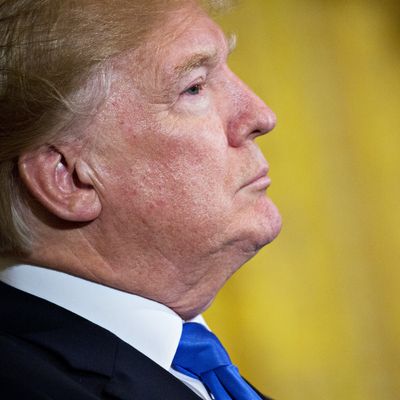
President Trump is determined to find some way to hurt Amazon, reports Jonathan Swan. “He’s obsessed with Amazon,” a source tells him. “Obsessed.” Swan details the economic arguments that Trump has rehearsed with the many people who have been exposed to his arguments against Amazon. Trump is reportedly “worried about mom-and-pop retailers being put out of business,” and believes “Amazon is killing shopping malls and brick-and-mortar retailers” and “has gotten a free ride from taxpayers and cushy treatment from the U.S. Postal Service.”
Well, sure, Trump probably believes those things, and some of them are even true. (Not the Post Office part, which Swan explains is a falsehood Trump clings to despite it having been explained to him, but the brick-and-mortar part.) But Trump doesn’t hate Amazon because of some old-economy “fixation with 1950s life,” as the story posits. Amazon is the outlet for his hatred of the Washington Post.
In theory, Trump might have developed an economic theory that Amazon is inappropriately benefitting from public policy, and have drawn critical conclusions about the journalism at the Post, and it is merely a coincidence that the same person, Jeff Bezos, owns both businesses. In practice, Trump makes no pretense of obscuring any connection between the two. When he lashes out at the Post’s coverage, he segues seamlessly to Amazon. Trump has done this over and over. He has done it on Twitter:
He has done it in speeches:
And he has done it in interviews, like this one from 2016 with Sean Hannity:
It’s interesting that you say that, because every hour we’re getting calls from reporters from the Washington Post asking ridiculous questions. And I will tell you. This is owned as a toy by Jeff Bezos, who controls Amazon. Amazon is getting away with murder, tax-wise. He’s using the Washington Post for power. So that the politicians in Washington don’t tax Amazon like they should be taxed. He’s getting absolutely away — he’s worried about me, and I think he said that to somebody … it was in some article, where he thinks I would go after him for antitrust. Because he’s got a huge antitrust problem because he’s controlling so much. Amazon is controlling so much of what they’re doing.
And what they’ve done is he bought this paper for practically nothing. And he’s using that as a tool for political power against me and against other people. And I’ll tell you what: We can’t let him get away with it. So he’s got about 20, 25 — I just heard they’re taking these really bad stories — I mean, they, you know, wrong, I wouldn’t even say bad. They’re wrong. And in many cases they have no proper information. And they’re putting them together, they’re slopping them together. And they’re gonna do a book. And the book is gonna be all false stuff because the stories are so wrong. And the reporters — I mean, one after another — so what they’re doing is he’s using that as a political instrument to try and stop antitrust, which he thinks I believe he’s antitrust, in other words, what he’s got is a monopoly. And he wants to make sure I don’t get in.
The sequence of Trump’s analysis in this passage goes Washington Post-Amazon-Washington Post-Amazon-Washington Post-Amazon-Washington Post-Amazon. Over time, his rationale has shifted from antitrust to internet taxes to postal shipping rates. Shockingly, he has not demonstrated an expertise in any of these policy areas, and it would be quite surprising to see him holding forth on postal-shipping reforms at a policy roundtable. The constant in all these complaints is the Post and its “fake” — i.e., real — news.
One of Trump’s deepest assumptions is that everybody, including the media, is utterly corrupt. (That’s why he has repeatedly stated that the media will endorse him in 2020 — because he’s good for their profits, and Trump cannot imagine a media outlet publishing coverage that would not benefit the profitability of its ownership.) Of the two newspapers he reads, Trump dismisses the New York Times as “failing,” and the Post as a tool of Amazon. And whatever the merits of his case about Amazon, it has nothing to do with helping mom-and-pop shops and everything to do with his authoritarian desire to control the news media.






























